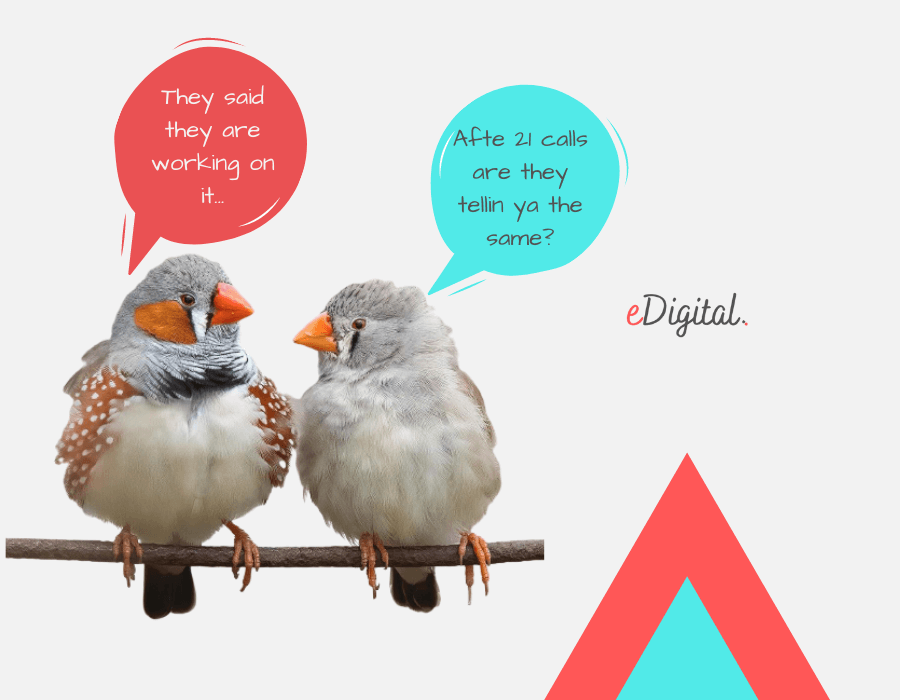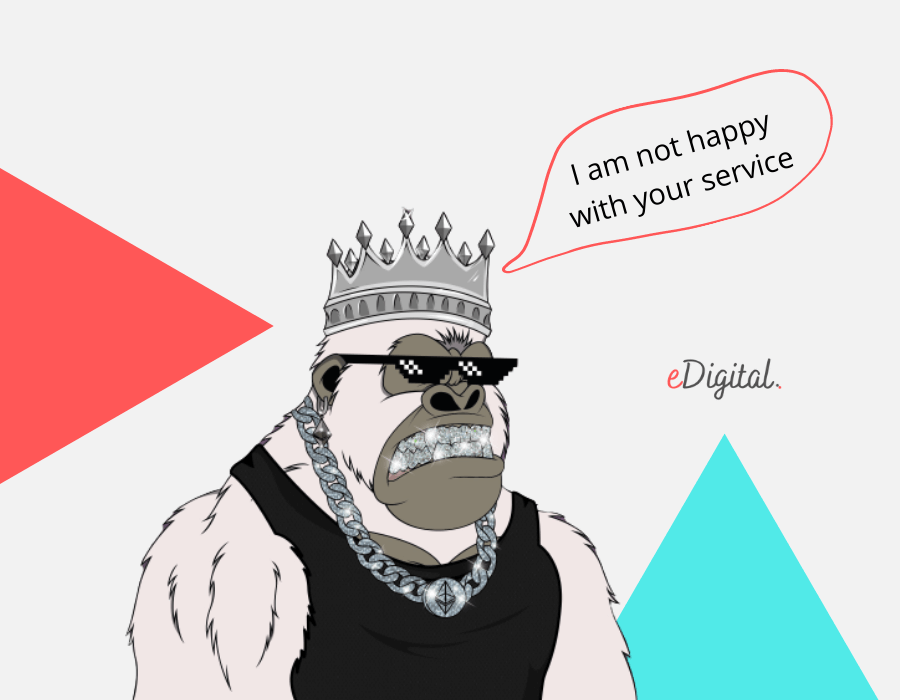THE BEST 10 CUSTOMER SERVICE SKILLS IN 2024
Find below the best 10 customer service skills in 2024. The top abilities needed for the successful delivery of customer service.
By Mau, a Senior Customer Service Specialist at eDigital.
THE BEST 10 CUSTOMER SERVICE SKILLS IN 2024
If you have assisted in one of my digital marketing strategy training workshops, you have already heard me saying:
“Customer service is about delivering basic customer service right, rather than trying to delight customers”
Yes, that’s right: “delighting” customers is not as effective as you may have imagined it.
An elemental psychological reason is behind this:
People value far more a “solving” hand when an issue arises that prevents them from the effective use or enjoyment of your brand rather than unexpected “over-the-top”, non-requested and non-necessary support.
I am not the only one proposing this idea.
You can find the same idea – backed up by studies and research – in these three best-selling books:
- The challenger sale: Taking control of the customer conversation
- The effortless experience: Conquering the new battleground for customer loyalty
- The challenger customer: Selling to the hidden influencer who can multiply your results.
Understanding this is one of the most fundamental steps before you try to learn the top skills and abilities for customer service.
10. BRAND KNOWLEDGE SKILLS
Everything in customer service should start by fully knowing your brand’s promise. The brand’s promise is the commitment your marketing department has made to your customers.
That commitment is the assurance and guarantee of what customers should expect, feel and think when buying your brand.
If Customer service/support representatives do not align with that emotional contract, you then either have to improve your customer support or change the brand promise.
Your customer support policies/procedures should facilitate not only resolving customer issues but also the process customers have to go through when buying your brand.
Understanding customers’ expectations up-front is part of your brand’s emotional contract with customers. And the top reasons to understand customer’s expectations upfront are:
-
- Fulfil those expectations.
- Help customers align false expectations before they get off the track down the road.
- Give some insights into particular needs that were not addressed in the sales process.
- Opportunity to increase your team’s upsell ability and combat potential complaints down the road before they fire: customers getting aggressive, violent, confrontational, argumentative, hostile or just simply very annoyed and/or frustrated with your product or service.
- Offer insights into additional products and services you could provide.
Tip: your customer service team should map out different customer journeys. This process will help you anticipate enquiries and offer solutions in advance and at scale.
For example, you could automate the below actions for all new customers:
- An email on how to interpret their monthly bill.
- Automatic reminders to watch video tutorials on how to successfully install the new product.
- Suggested “next steps” so new customers know what they should do for a seamless experience.
Note: Dealing with aggressive customers can be scarier than watching one of the best Netflix horror movies. Automated customer flows should also allow customers to interact with real humans. Hearing customers and letting them vent their anger can highly reduce further confrontations that may cost your business extra money, time and resources.
Join 5k+ subscribers and receive the best digital marketing tips!
9. CLEAR COMMUNICATIONS SKILLS
- Deliver easy instructions on how to contact or follow up on the customer’s issue. People may expect that they can easily contact you via email or phone. For example, you cannot contact Instagram customer support email or call the Instagram customer service phone number. Instagram has a procedure in its app to make sure people can find the solution via its self-service and if not possible, then people can fill in a form.
- Deliver optimal messages for specific customers’ personalities and emotions. Emotional disconnects between customers and customer support staff are common in organisations that have not yet crafted a professional customer service plan. Examples include:
- A potential customer does not value, understand or trust the information presented by a sales representative.
- A customer didn’t like the answer given by a customer support representative and was left with the impression an outdated company policy was behind the answer.
With some basic training, your customer service team members can eliminate many interpersonal issues and thereby reduce repeat calls.
Customer service training should include the following:
- How to listen for clues to a customer’s personality type. The quicker you can assess whether you are talking to a “controller,” a “thinker,” a “feeler,” or an “entertainer,” and tailor your responses accordingly, the better you can provide detail and speed appropriate for the personality type. This strategy has proven to reduce repeat calls for some companies.
- Look at past call transcripts and pinpoint words that tend to trigger negative reactions and drive repeat calls—words like “can’t,” “won’t,” and “don’t”—and train your team on alternate phrasing. For example, instead of saying: “We don’t have it in stock” you could say: “The good news is the item will be ready to be dispatched in two weeks” Through such simple changes in language, you can lower your customer effort scores.
- How to create “positive” experiences out of potential “disappointing” ones. For example, a customer who wants to book your service for an unavailable time may be happy when you provide a couple of compelling reasons why other times may fit better with the current customer’s needs. To be great at this, you will have to train your team at finding out more about the top reasons customers want to book your service. This strategy can result in a decrease in repeat enquiries.
The ability to communicate effectively also includes reiteration. Successful customer support assistants show that they have understood a customer issue or an enquiry by confirming it back to the customer for clarity. This includes also repeating a solution or a procedure the customer service representative will take.
Lastly, a customer support agent should have the skills to professionally close the conversation by offering any learning material or any information that may prevent the issue from happening again. The customer success manager may use this opportunity to upsell and offer the customer a better/premium service.
8. EFFECTIVE LISTENING SKILLS
Listen between the lines to deliver what customers want.
When you have carefully crafted your customer experience design and process, you will “wow” customers and they will stay with you longer, spend more and they will talk about the experience to family and friends.
If the customer has an issue and does end up contacting you first with some kind of complaint, the key here is to listen and let them bend. Do not cut them off, let them talk. Let them run through it, sometimes they talk for 20 or 40 minutes straight before your customer service rep has a chance to even say a word. And this is fine.
Popular today > The best customer service plan template
7. PROACTIVE SKILLS – ANTICIPATE CUSTOMERS’ NEEDS
Anything that looks like it is not going to meet your customers’ expectations, you need to instantly communicate that to the customer. For example, if a deadline is going to get pushed back, then you call them right away, Be upfront with it, talk about it before takes a minute longer in your schedule and make it a top priority. If the product was not delivered correctly, if there was some kind of an issue, if something was missing, or if there was a quality issue, you want to be ahead of it, ideally, you want to find this information out before the customer and communicate that to them. What we found is that if you are proactive and honest and you contact the customer in advance and say: “hey this is what happened and I am on it“, typically what they want is just to feel that you have listened to their issue, you are working on it, you have a strategy to improve upon it, if you communicate those things, it be an opportunity to earn additional trust and even if you did not meet the expectation for that one particular piece of the service, the fact that you proactively communicate it sort of exceeds expectations to what they normally receive in the general world and win their trust.
Being proactive also means, you can have answers ready for key days when there is popular demand. Customer service teams should plan any issues, especially for key days such as Mother’s Day, Valentine’s Day, Father’s Day, Black Friday sales, December sales (Christmas season), January sales, etc.
Note: In Japan, there is a concept called: Oshibori which is a never-ending process of designing delightful experiences. Customers might expect a new type of Oshibory: one that is unscented, or from organic fabric, not too cold, not too hot, plastic-free or not even handed, just there ready for you. Oshibori is one of the fuels for business success but delighting will not work if your basic customer support is not delivered effectively and at the right time.
“Only through dedication with a pure heart can you share a special moment with your guest. With this, Sen no Rikyū established the foundations of Japanese Omotenashi. Omotenashi is a selfless approach to receiving guests with a perfect balance of attentive care and unobtrusiveness. It creates an intimate environment of trust, relaxation and respect while leaving an ever-lasting impression”
6. EMPATHY SKILLS
Sometimes, customer service representatives have to cushion the conversation at the right moment. This means a customer service member should have the skill to respond with some empathy towards the customer’s situation and the complaint.
WHAT DOES INFURIATE PEOPLE THE MOST?
Below are some of the things you want to avoid when drafting your customer service journeys:
- Customers resent having to contact the company repeatedly (or be transferred) to get an issue resolved.
- Having to repeat personal information.
- Having to switch from one service channel to another. For example, needing to call after trying unsuccessfully to solve a problem through a live chat or FAQ page.
5. ABILITY TO TAKE RESPONSIBILITY AND APOLOGISE
If it is clear that you, a team member or the quality of the product or service was not up to the standard, your customer service team should take responsibility and apologise.
4. NEGOTIATION SKILLS
Successful customer service reps know how to present a favourable solution, a path to a resolution or an option.
A well-trained customer service assistant has taken the angry customer from a critical moment to a more compelling and compassionate one where they feel more comfortable about your brand (customer recovery process).
A top customer support agent lets the customer know about the exact people, tools and procedures designated to get the issue solved.
Sometimes, customer service teams can offer a gift card or a hand-written note or a quick gift to say:
“We are sorry that happened to you, this is a gift card to compensate for the hassle”
This type of great customer service follow-up will bring the unhappy customer back to a place of confidence in your brand and may bring referrals.
“When basic customer support fails, customers will punish you badly. If you stop delighting them with unnecessary support, they just do not care. Solve basic issues quickly and effectively”
Mau, Global Head of Marketing Strategy at eDigital
⚡️Trending this week > How to write the best customer service plan + template
3. SELF-CONTROL SKILLS
Customer support representatives will need to show self-control skills as angry customers can blow up and shout really bad words. Customer support team members who can remain calm even to the most furious, infuriated or fuming customers – even when being verbally attacked – know how to use language to calm the customer down and get them to their side.
Other times, customers may just be confused and not get what they have to do to solve the issue they are facing with your brand even if the steps given by the customer support representative are simple to follow. Not all customers are educated equally, so a task that is easy for one, maybe the most complicated task for another. Patience is a top skill needed to be able to educate and find creative ways to explain the same solution to even the most pessimistic or dumb customer.
2. DILIGENCE SKILLS
Before emailing or calling a company, customers search on Google for an answer or a solution to their issue or challenge with your brand. Make sure the answers offered by your automated self-service customer bot (software) or the FAQ section on your website are up-to-date and relevant to the most common issues and challenges faced by your most profitable customers.
Map out the customer support journey with anything that may go wrong in the process of purchase, delivery and consumption (usage) of your brand and how you are going to respond to those potential challenges and/or issues. These actions will:
- Build rapport with your customers.
- Increase up-sellability
- Increase your referral business
Expert tip: a great CRM (customer relationship management software) with custom fields for answering key questions such as: “What’s their expectation” and “How do we exceed this expectation” is ideal. If you record the answers for each customer, you will be more likely to reach your customer loyalty and repeat sales goals.
1. ABILITY TO ADMIT YOU DO NOT HAVE THE ANSWER
Instead of saying:
- “I do not know”, top reps would say: “I do not have the answer to that right now, but I am going to check with… and I will call you back in X minutes”
- “I cannot do that”, top reps would say: “Please allow me a couple of minutes to double-check if that’s possible”
Top customer service reps avoid saying to a customer: “I cannot do this/that” or “I do not know“. If the rep cannot fix the issue straight away, the rep should find someone who can provide a solution/answer, or get a supervisor to find a solution. Even if this means the customer has to wait a bit longer until you find the right people, it is ok, the customer will appreciate the efforts taken.
Top customer service reps have the skills to make the customer feel a positive resolution is on the way.
CONCLUSION
Brands are finding their feet and learning about how to create the best Customer Service Plans in a changing world.
Some brands are lucky – they have both the technological set-up to support demand, and the demand itself is there.
For others, demand for their products and services struggles to grapple with new technologies that could help them re-establish a connection with their customers.
Some of your consumers, customers and clients will praise or punish your organisation and brands.
And that’s ok as long as you take the learnings, pivot and offer the best customer service experience possible.
To do that, you will need the best Customer Service Plan.
Next > How to write the best customer service plan + template
⚡️ Most views today > How to write a winning apology letter/email to a customer
eDigital can help you conceptualise, plan, develop, run and optimise successful marketing campaigns that generate leads and sales for your brand.
Our digital marketing services include:
- Strategic planning for social media and other digital marketing channels.
- Online advertising management and optimisation (Search, Display, social media ads and re-marketing).
- Marketing training: social media training and digital marketing training.
- SEO strategy and execution. Including content development (articles, stories, eye-catching and SEO-optimised visuals).
- Celebrity and influencer marketing campaign strategy.
- Brand development. Logo creation, brand personality development and design of marketing materials.
- Consumer contests/competitions/giveaways.
- Email marketing. Dip sequence design and deployment.
- Conversion rate optimisation. It is also called “path to purchase” optimisation.
Contact us today and start boosting your leads and sales.
Hundreds of marketers have supported us with their generous donations. Donate today! or join 5k+ marketers receiving our e-newsletter.
Final note: Want to reduce customer acquisition costs and dependency on paid media? eDigital‘s marketing strategy training will unmercifully review your marketing, help you build a marketing engine with channels and assets you own, stir your team’s thinking, bring new ideas for new conversion paths and boost customer lifetime value.
THE BEST CUSTOMER SERVICE SKILLS IN 2024
Mau is one of the most popular marketing consultants offering the best marketing strategy training and the best social media training. Top marketers use Mau’s popular Digital Marketing Plan and Social Media Plan templates.
Book Mau for your next training day or join 5k+ marketers receiving Mau‘s e-newsletter.
Related: How to write the best customer service plan and template.








